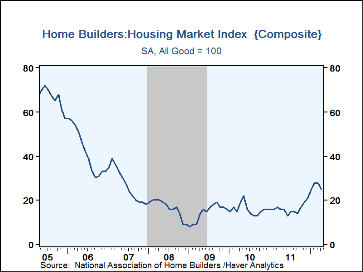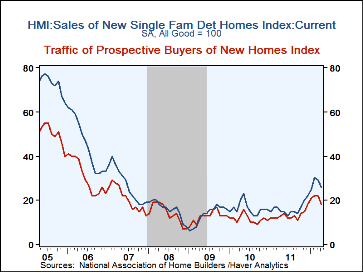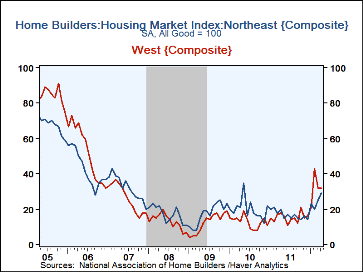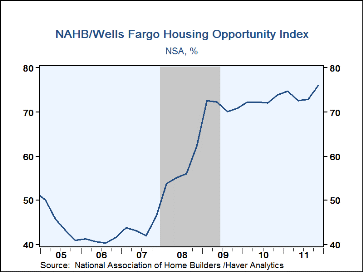 Global| Apr 16 2012
Global| Apr 16 2012U.S. Home Builders' Index Declines
by:Tom Moeller
|in:Economy in Brief
Summary
The National Association of Home Builders/Wells Fargo reported weaker housing activity. The Composite Housing Market Index for April fell to 25 which was its lowest since January. Earlier figures were unrevised The index of single- [...]
The National Association of Home Builders/Wells Fargo reported weaker housing activity. The Composite Housing Market Index for April fell to 25 which was its lowest since January. Earlier figures were unrevised The index of single-family home sales fell to 26, down for the second consecutive month. Moreover, the figure still was lower than levels near 70 in 2004. The index of sales during the next six months reversed earlier gains with a decline to 32. Finally, the home builders' index of traffic of prospective fell to 18. its lowest since November. By region, the Northeast and the West remained strong but the Midwest & South both fell. The NAHB figures are seasonally adjusted.
The Home Builders' Housing Opportunity Index, which is the share of homes sold that could be considered affordable to a family earning the median income, improved slightly in Q4 to 75.9% and reached the record high, buoyed by lower home prices, lower interest rates and higher income. (There is a break in the series from 2002 to 2003.)
The Home Builders index is compiled from survey questions asking builders to rate market conditions as "good," "fair," "poor" or "very high" to "very low." The figure is thus a diffusion index with numerical results over 50 indicating a predominance of "good" readings.
The NAHB has compiled the Housing Market Index since 1985. The weights assigned to the individual index components are .5920 for single family detached sales, present-time, .1358 for single family detached sales, next six months; and .2722 for traffic of prospective buyers. The results, along with other housing and remodeling indexes from NAHB Economics, are included in Haver's SURVEYS database. The expectation figure is available in Haver's MMSAMER database.
| National Association of Home Builders | Apr | Mar | Feb | Apr'11 | 2011 | 2010 | 2009 |
|---|---|---|---|---|---|---|---|
| Composite Housing Market Index, SA (All Good=100) | 25 | 28 | 28 | 16 | 16 | 16 | 15 |
| Single-Family Sales | 26 | 29 | 30 | 15 | 16 | 16 | 13 |
| Single-Family Sales: Next Six Months | 32 | 36 | 34 | 22 | 23 | 23 | 24 |
| Traffic of Prospective Buyers | 18 | 22 | 22 | 13 | 11 | 12 | 13 |
| Northeast | 29 | 25 | 20 | 20 | 17 | 20 | 17 |
| Midwest | 23 | 31 | 30 | 14 | 14 | 14 | 13 |
| South | 24 | 27 | 25 | 15 | 18 | 17 | 16 |
| West | 32 | 32 | 43 | 18 | 15 | 13 | 12 |
Tom Moeller
AuthorMore in Author Profile »Prior to joining Haver Analytics in 2000, Mr. Moeller worked as the Economist at Chancellor Capital Management from 1985 to 1999. There, he developed comprehensive economic forecasts and interpreted economic data for equity and fixed income portfolio managers. Also at Chancellor, Mr. Moeller worked as an equity analyst and was responsible for researching and rating companies in the economically sensitive automobile and housing industries for investment in Chancellor’s equity portfolio. Prior to joining Chancellor, Mr. Moeller was an Economist at Citibank from 1979 to 1984. He also analyzed pricing behavior in the metals industry for the Council on Wage and Price Stability in Washington, D.C. In 1999, Mr. Moeller received the award for most accurate forecast from the Forecasters' Club of New York. From 1990 to 1992 he was President of the New York Association for Business Economists. Mr. Moeller earned an M.B.A. in Finance from Fordham University, where he graduated in 1987. He holds a Bachelor of Arts in Economics from George Washington University.
More Economy in Brief
 Global| Feb 05 2026
Global| Feb 05 2026Charts of the Week: Balanced Policy, Resilient Data and AI Narratives
by:Andrew Cates










